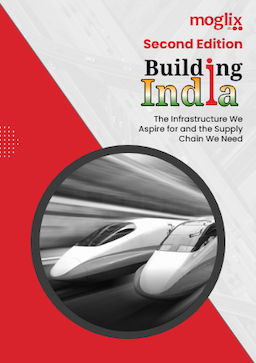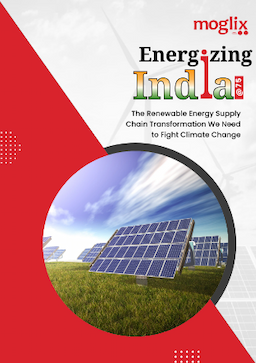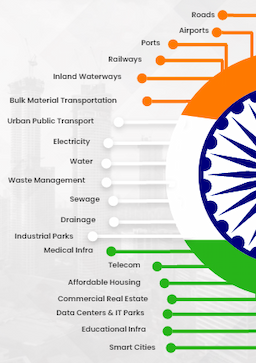Energizing India@75: The Renewable Energy Supply Chain Transformation We Need to Fight Climate Change

About the Release of The E Book?
The significance of year 2022 is best established through the coordinates of three events. These are; the completion of 75 years of India's independence, the beginning of the end of the COVID19 pandemic, and the Russia Ukraine war. Each of these events are major global phenomena that generate externalities that impact us. Strangely though the event that continues to happen every year but continues to elude our agenda every year is climate change.
A nation gaining independence, a pandemic, a war and even climate change are all public goods with two specific properties: non-rivalrous and non-excludable. These are non-rivalrous because these public goods do non deplete in supply as more people consume them and non-excludable because the impact spills over to individuals and communities who may or may not want to consume it.
Why This E-Book?
At Moglix Business, we have arrived at the following learning outcomes that are relevant to our country, the customers we serve, and the communities we engage with:
- The war bears testimony to how a country's bargaining power of energy security can turn the tide and control the momentum of other nations' economic sovereignty, Energy security is integral to protecting economic sovereignty and for an emerging economy like India that is vouching for a greater share of the global manufacturing supply chain it's a question of “staying relevant.” Atma Nirbhar Bharat or a Self-Reliant India is not merely a wishful statement but a mission of 1.38 billion people.
- While the environment that we so generously use as a waste sink to dump carbon emissions is a public good, its spill over effects on the health, the territory of the planet that we inhabit (land, water, and air), jobs, lives, and livelihoods are purely private goods. Our energy sector accounts for 40% of our country’s greenhouse gas (GHG) and carbon emissions. The commitment of the Honorable Prime Minister of India, Shri Narendar Modi to decarbonize our supply chain ecosystem and touch net zero carbon emissions at the COP26 Summit on the side-lines of the Glasgow Accord is a vision for healthier people, a greener planet, and cleaner livelihoods.
Net Zero by 2070 is our opportunity to add a massive USD 1 trillion to our GDP by 2030 and USD 15 trillion by 2070. The manufacturing supply chain transformation that we need to get there forms the crux of the e-book “Energizing India@75: The Renewable Energy Supply Chain Transformation We Need to Fight Climate Change”
Who Should Read This E Book?
Renewable energy companies, EPC project developers, independent power producers (IPPs), OEMs in the manufacturing of solar PV modules, modular mounting structures, silicon wafers/INGOTS, and MSMEs that provide custom manufacturing solutions of ZED (zero defect zero effect) grade will be the ones leading India through this grey to green supply chain transformation towards sustainability.
Correspondingly these enterprises and communities of people who create value for them are the target audience of this e-book.
What Are the Contents of This E-Book?
This e-book contains insights on:
- The opportunity size of India's grey to green energy supply chain transformation in the backdrop of our commitments to Net Zero by 2070 at COP26
- Opportunities, job creation potential, location mapping, and project pipeline status across sub-sectors in India's renewable energy mix such as bio-mass, solar PV, floating solar, wind, storage, open access, and hybrid (solar + wind)
- The delta between India's composition of energy matrix in 2022 and the projected energy matrix for 2030
- The net investment required in India's renewable energy sector to reach the 2030 milestone
- Ecosystem enablers like the Productivity Linked Incentive (PLI) scheme to get to net zero
- Breakdown of such investment into two parts: investment in power generation capacity and investment in transmission & distribution grid (T &D)
- Debt equity infusion ratio metrics across all sub sectors in India’s renewable energy mix
- CO2 emission avoidance opportunities across all sub sectors in India’s renewable energy mix and why solar PV projects are a clear winner
- Value chain analysis of manufacturing of solar PV modules, solar PV cells, solar wagers/INGOTs, and polysilicon
- Checklist for lenders offering project capital to EPC project developers and Independent Power Producers (IPPs)
- Types of risk factors affecting solar projects: regulatory, project, and financial risks
- Ratio between CAPEX outlay and OPEX procurement for each component of the solar PV value chain
Moglix is a trusted partner in transforming end-to-end supply chain management for 500+ global companies.
Learn more about how we can help you build the capabilities to reinvent your procurement and supply chain operations and achieve transformative business results today and tomorrow.



